How’s Your Microbiome?
How’s Your Microbiome?
By Laura Tenpenny (’11)
A diagnosis of astigmatism and lazy eye exposed Tyler Myers (Class of 2025) to a world of science and medicine that sparked a clarity of passion and purpose. After a difficult journey through multiple medical opinions, eight-year-old Myers was referred to a clinical trial with Vanderbilt Eye Institute.
“My doctor was always super kind. He explained every parameter of the trial in a way that made sense, even to a kid in elementary school,” says Myers. “He would relate science and data to helping people feel better. He showed me that information gleaned from one patient could amplify results to a broader population.
“It made me think, ‘I want to be that kind of physician-scientist when I grow up. I want to give my patients hope where hope didn’t exist.’”
The 15-year trial corrected Myers’ eye concerns, and since then he has devoted all his efforts to becoming the empathetic doctor and researcher he saw modelled during his treatment.
Myers recently received the Torchbearer Award, the highest undergraduate student honor from the University of Tennessee, Knoxville, where he has pursued a dual degree in neuroscience and microbiology. Torchbearers demonstrate academic excellence and a commitment to service and leadership. The recognition signifies how much closer he has become to realizing the dreams of his eight-year-old self, with graduation in view, and how his experience at UT has accelerated his path forward.
“I’d love to help better understand how we can modify gut bacteria—like I did in the nematodes in Heidi’s lab—to potentially provide interventions for neurological diseases like Parkinson’s with the goal of engaging potential new treatments that give patients hope.”
Tyler Myers
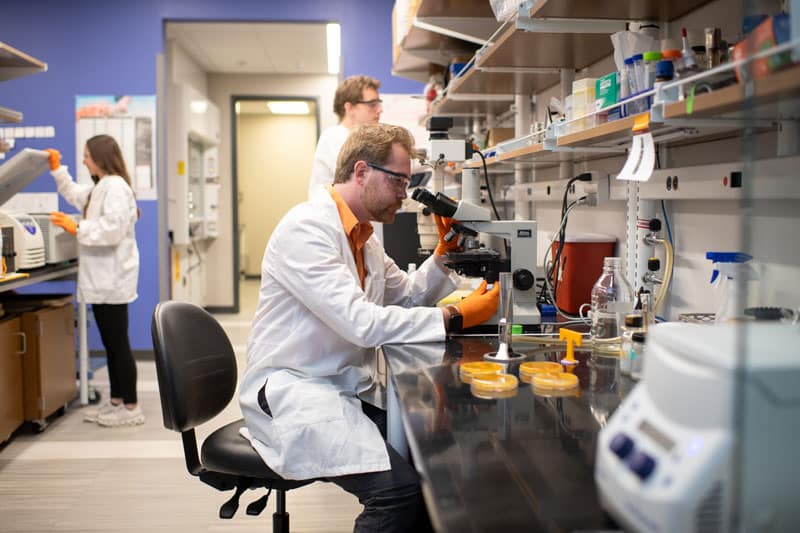
A major part of that experience includes working as an undergraduate research assistant the last four years under the guidance of Heidi Goodrich-Blair, the David and Sandra White Professor and Head of the Department of Microbiology. Myers studied entomopathogenic nematodes, microscopic worms that live in the soil and infect insects. These simple organisms have gut bacteria that model our own. His work has contributed to better understanding of how gut bacteria impact animal hosts, including humans, from driving infections to shaping behavior and development.
“This research correlates to my academic interests in the brain, specifically how the brain is affected by its environment—the gut-brain connection,” says Myers. “I want to do my PhD in microbiology, study the microbiome and its effect on the brain, and pursue clinical training in neurology, or possibly psychiatry. After earning my MD and completing residency, I could have a lab where we study the microbiome, using techniques from microbiology but in a clinical setting, and really probe that gut-brain connection.
“I’d love to help better understand how we can modify gut bacteria—like I did in the nematodes in Heidi’s lab—to potentially provide interventions for neurological diseases like Parkinson’s with the goal of engaging potential new treatments that give patients hope.”
Myers has strategically pursued research in the gut-brain connection, setting foot in labs and clinics near and far from campus for internships and fellowships.
“Tyler’s drive to push the boundaries of research and service is uniquely inspiring,” says Janna Harvey, associate director for undergraduate research and fellowships. “Through his own drive and vision, he has pursued research at UT, Oak Ridge National Lab, and Duke University through the Amgen Scholars Program. With support from the Office of Undergraduate Research and Fellowships, he earned national recognition with the Goldwater and Churchill Scholarships—as UT’s first Churchill recipient.”
The news came earlier this year that Myers is one of 18 American students selected annually by The Winston Churchill Foundation to pursue a master’s degree at the University of Cambridge in the fields of science, mathematics, and engineering.
“Tyler’s drive to push the boundaries of research and service is uniquely inspiring.”
Janna Harvey, associate director for Undergraduate Research and Fellowships
“I’ll have access to new networks and resources for furthering my knowledge of the gut-brain connection as I pursue a Master of Philosophy in Toxicology,” says Myers. “My biggest source of support in all my research endeavors has been the Office of Undergraduate Research and Fellowships. They helped review essays, perform mock interviews, provide opportunities to get connected with national conferences—they’ve served as a strong catalyst for a lot of really cool experiences.”
That includes serving as editor-in-chief for Pursuit, the university’s scholarly peer-reviewed journal led by undergraduates and devoted exclusively to undergraduate research.
“My classes taught me science and data analysis, but my mentors with the Office of Undergraduate Research and Fellowships and my time with Pursuit have taught me how to transform that science into something that’s more accessible to people,” says Myers. “Learning how to tell a story has been the cornerstone of applying for fellowships like the Churchill, publishing research, and presenting that research.”
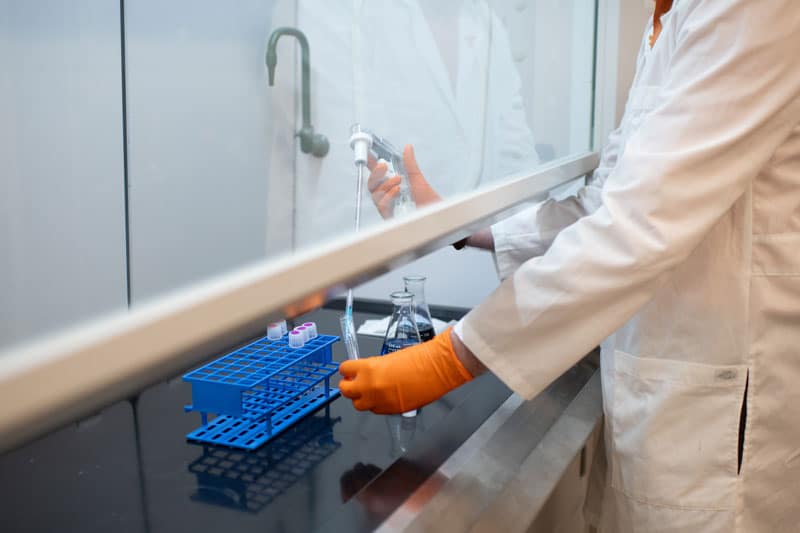
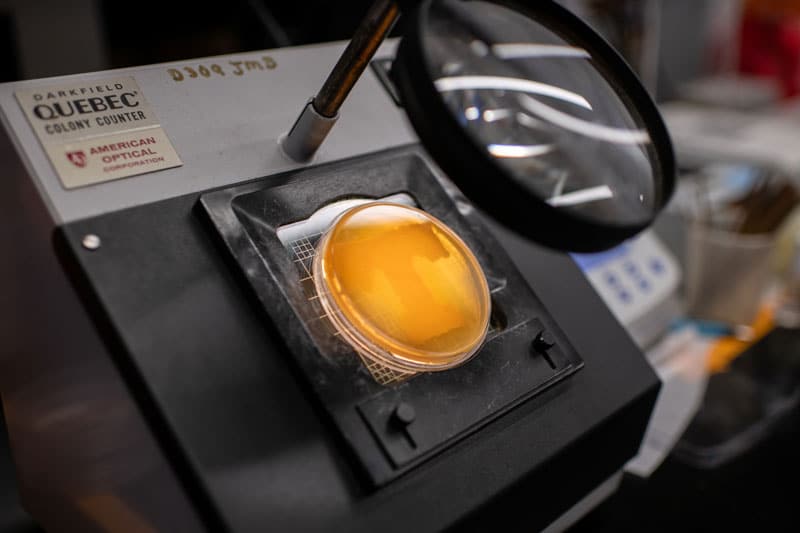
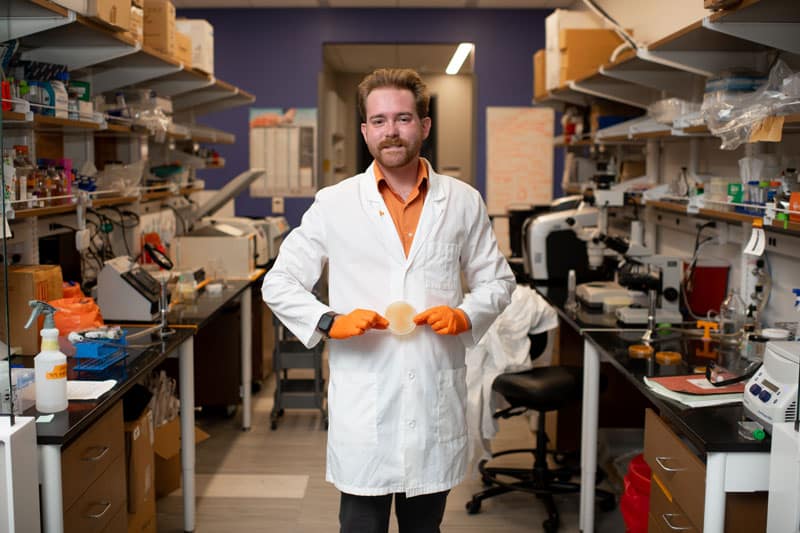
Through job shadowing at UT Medical Center (UTMC) and mentorship opportunities made available to Myers through his studies, Haslam Scholars, and Leadership Knoxville Scholars (LKS), he has also learned about the business side of medicine during his time at UT.
“Earning a medical degree will teach you how to be a doctor, but it doesn’t teach you about how to manage up to leadership, handle insurance, or work on a large team with diverse responsibilities—all the different aspects that go into running a large medical institution,” says Myers. “My mentorship with George Baddour, vice president of the Orthopaedic Institute at UTMC, through Leadership Knoxville helped me understand more about working in a large hospital setting, which is great because that’s where I could envision myself working.”
In addition to the mentorship component, Leadership Knoxville Scholars also complete a community action project that involves working with a community partner to make a positive impact to the Knoxville area. Myers worked with the food systems group at United Way of Greater Knoxville.
“When I got involved in research, one thing that I committed to was translating whatever I’m doing into something that’s serving my community. Research is a public service. It does benefit community, but I want to be in the field hearing people’s stories, so I can incorporate that into what I’m doing in the lab,” explains Myers. “Nutrition is one of the best ways to translate to communities what I’m passionate about in science and medicine (gut-brain health), so I was excited to work on a long-term project with United Way’s food systems team to address food deserts in the Knoxville area.”
His work with United Way helped develop a map of food resources for schools in food-insecure areas of the city and train community school coordinators on how to utilize this map to serve their families.
“Tyler is an excellent example of the Jones Center’s belief that service connects us to a larger purpose and illuminates the interconnectedness of our world. Tyler is never one to boast about his accomplishments because he isn’t interested in accolades. He cares about creating change and making the communities around him better.”
Natalie Frankel, associate director for community engagement and volunteerism
Natalie Frankel led Myers and other scholars in the program as associate director for community engagement and volunteerism for the Clay and Debbie Jones Center for Leadership and Service.
“Tyler is an excellent example of the Jones Center’s belief that service connects us to a larger purpose and illuminates the interconnectedness of our world,” says Frankel. “Tyler is never one to boast about his accomplishments because he isn’t interested in accolades. He cares about creating change and making the communities around him better.”
With service high on Myers’ long list of priorities, and correlating those experiences to his research, Myers has also volunteered with the Pat Summitt Clinic and spent the last two years interning with Genesis Neuroscience Clinic, which treats patients with dementia and Alzheimer’s disease.
“It’s common for UT neuroscience majors who want to go to medical school to intern there, and I’ve loved it,” says Myers. “I’ve administered neurocognitive exams, charted results from those exams, analyzed MRI scans of patient brains, and even learned about different interventions from the clinic’s physician and nurse practitioners
“One of those interventions we often recommend promotes a Mediterranean-based diet. Even if I don’t go into neurodegenerative disease, Genesis has given me meaningful connections with patients, a good understanding of how diet interacts with the brain, and how to leverage that knowledge for neuroscience-related medicine.”
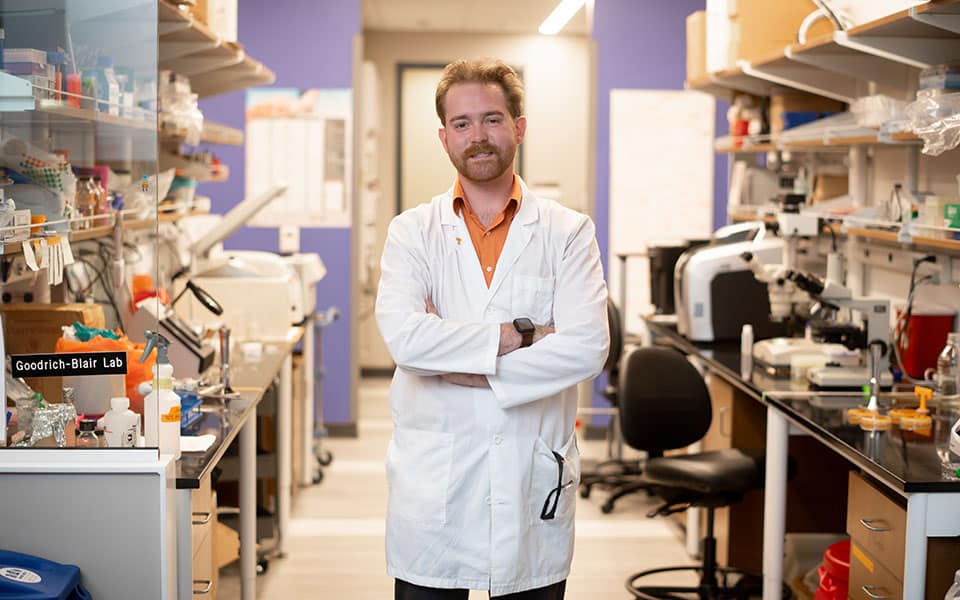
I want to be in the field, hearing people’s stories, so I can incorporate that into what I’m doing in the lab.”
Tyler Myers
I want to be in the field, hearing people’s stories, so I can incorporate that into what I’m doing in the lab.”
Tyler Myers
Myers shared the Genesis internship experience with fellow neuroscience major, junior Jerome Jarjoura. The two became friends through shared interests and involvements.
“I’ve advised younger students through my involvement with Pursuit and undergraduate research, Haslam Leadership Scholars, and KLS,” says Myers. “But I met Jerome through the Advancement of Neuroscience Club. We get together about once a month just to talk about life, what we’re into, and what we’re trying to accomplish during and after our time at UT.
“I’ve really enjoyed watching him grow as a student. He’s a campus ambassador and part of LKS, as well. I also helped him apply for Amgen Scholars, and it was just announced that he landed a position in the cohort at Harvard University! He’s really demonstrating himself as a leader, which has been so awesome to see.”
“I got to meet Mr. and Mrs. Berry, and they’ve been a voice in my corner saying, ‘You got this—just keep going! This scholarship is a testament that you’re doing really great things at UT.’”
Tyler Myers
Throughout his four years, Myers has had his own share of mentors and supporters. Among those, he counts UT alumni Mike (’77) and Nancy (’78) Berry, donors to one of his many scholarships and recognitions. They established the Mike and Nancy Berry UT Knoxville Alumni SAA Scholarship, which Myers received as part of Student Alumni Associates (SAA) for commitment to improving student-alumni relations. Recently, SAA also awarded him Member of the Year.
“I got to meet Mr. and Mrs. Berry, and they’ve been a voice in my corner saying, ‘You got this—just keep going! This scholarship is a testament that you’re doing really great things at UT.’
“That’s the intangible value garnered from alumni and donor support to students. It’s not just opportunities donors enable, it’s knowing there are people invested in my success. It gives me a sense of responsibility—I’ve been charged to be my best self and take advantage of every opportunity. It’s an invitation to put myself outside my comfort zone, to try new things. Having that moral support through scholarships and activities that donors give to UT has been priceless.”
Another of those donor-supported activities includes Haslam Leadership Scholars, a premier university honors program established through the generosity of alumni Jimmy and Dee Haslam and Jim and Natalie Haslam. While Myers has been part of countless programs and organizations, from College of Arts and Sciences Ambassadors to UT Outdoor Pursuits, Haslam Scholars is one of the major reasons Myers chose to attend UT.
“You come in with a cohort of 14 other students from diverse fields, but we all come together around conversations on leadership, our place in society, and how we can try to elevate each other to have a positive impact on campus and beyond,” says Myers. “That kind of community at UT is undeniable. Compared to other colleges, it’s so visible that every student no matter how different is still a part of one UT—we still wear orange and all scream at 120-plus decibels on game day in Neyland.”
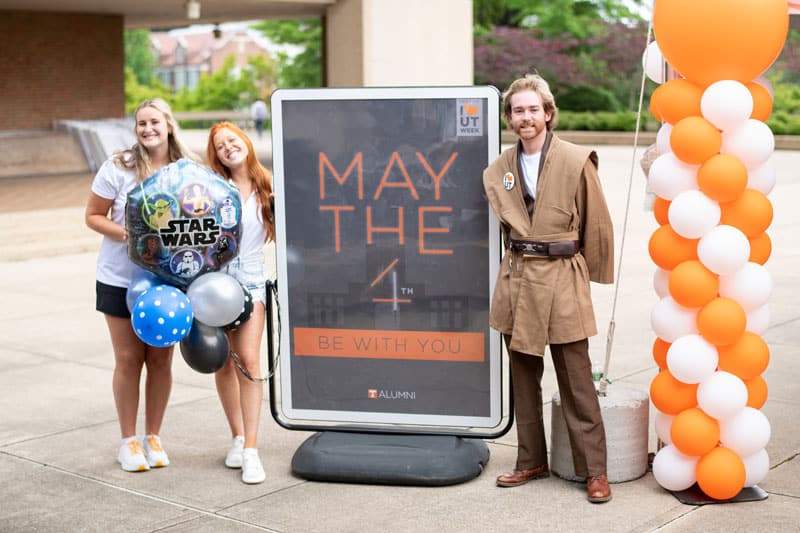
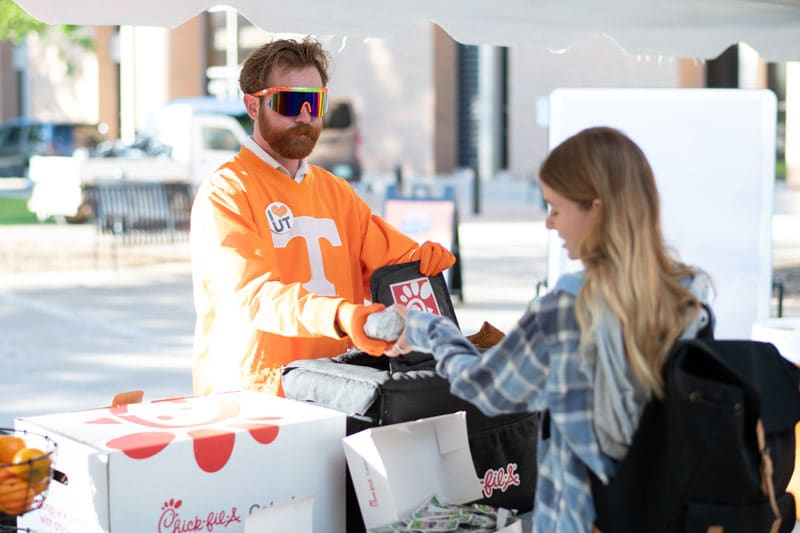
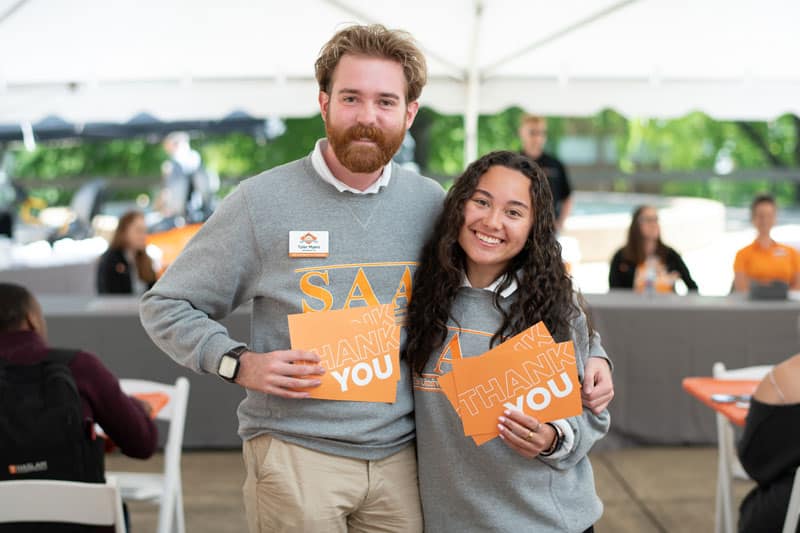
But UT really stood out as a premier research institution, a catalyst for achieving what Myers has been working toward since he was a child in his eye doctor’s office: “When I looked at UT compared to other schools, it stood out for value. It’s an R1 institution that engages in groundbreaking research with excellent programs for what I wanted to study.”
With the commencement stage before him, Myers’ next steps will take place at Cambridge. He stayed in touch with the eye doctor who inspired his pursuit of a medical research lab; his doctor even gave Myers advice for his medical school applications. Myers plans to ask for deferral for the duration of his Cambridge studies for any medical school offers he receives—doubtless there will be many.
